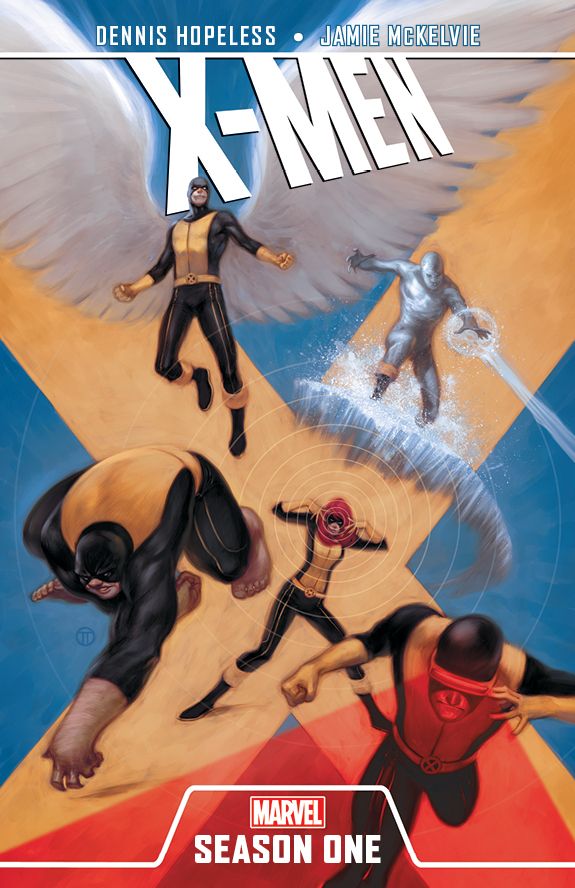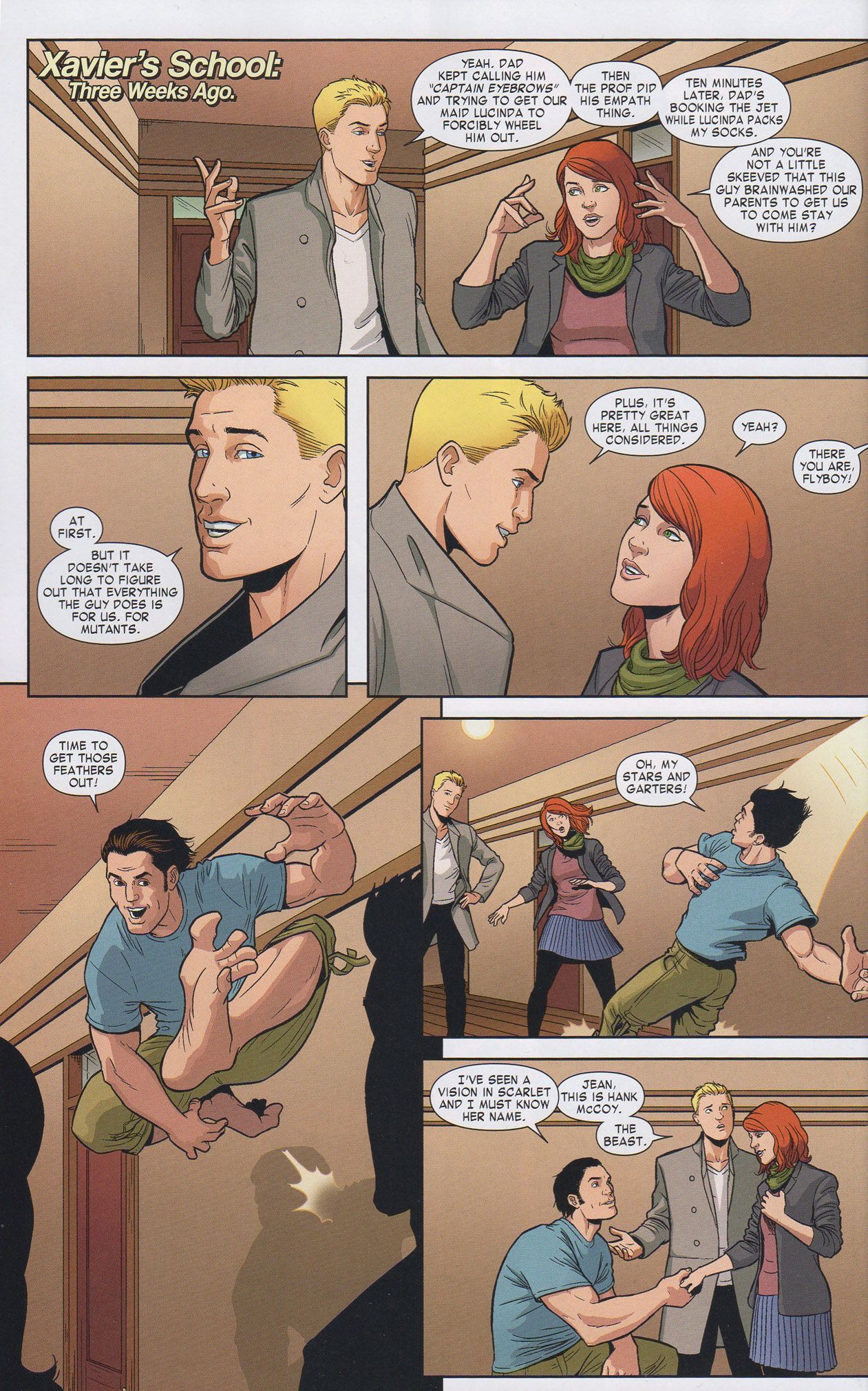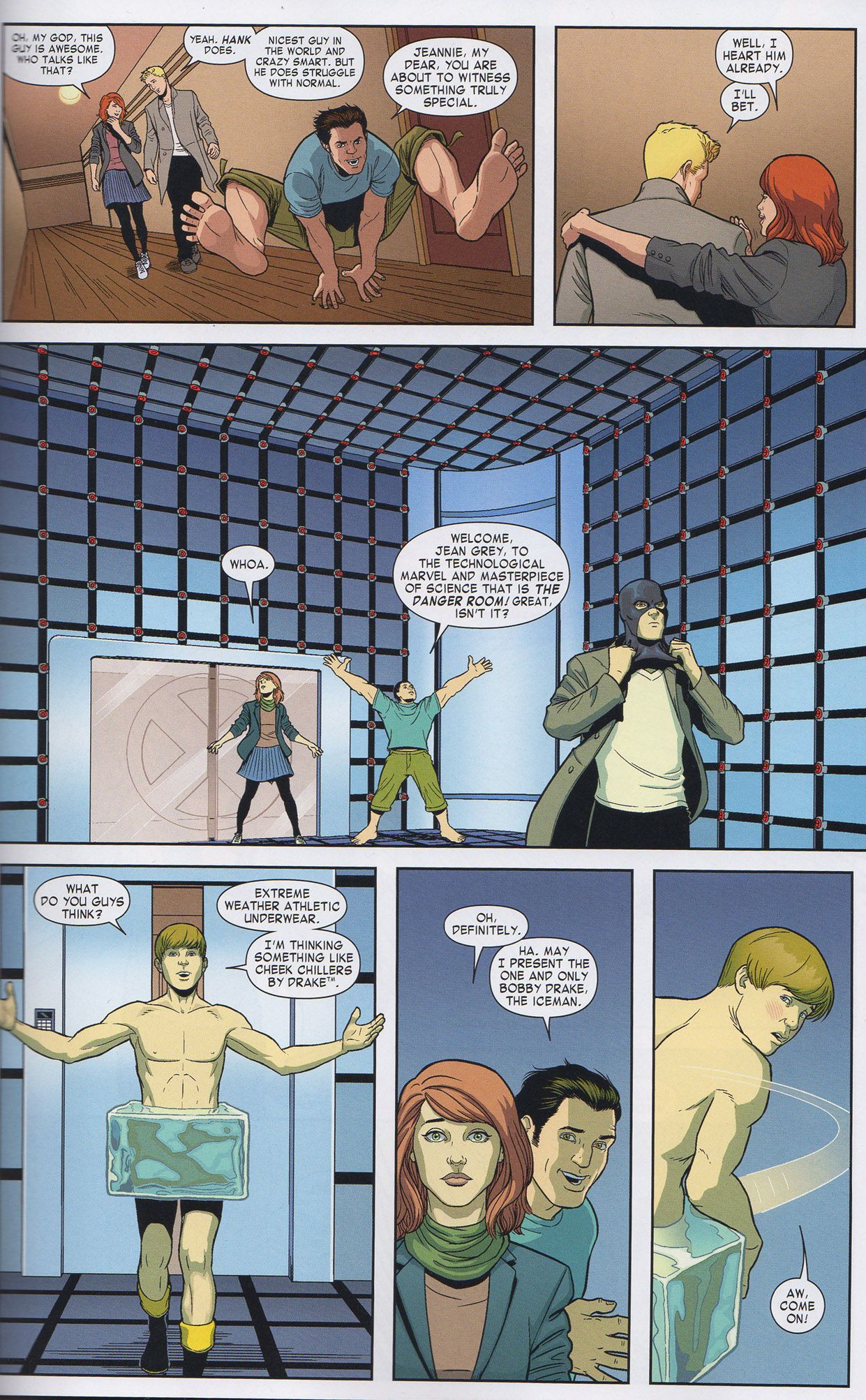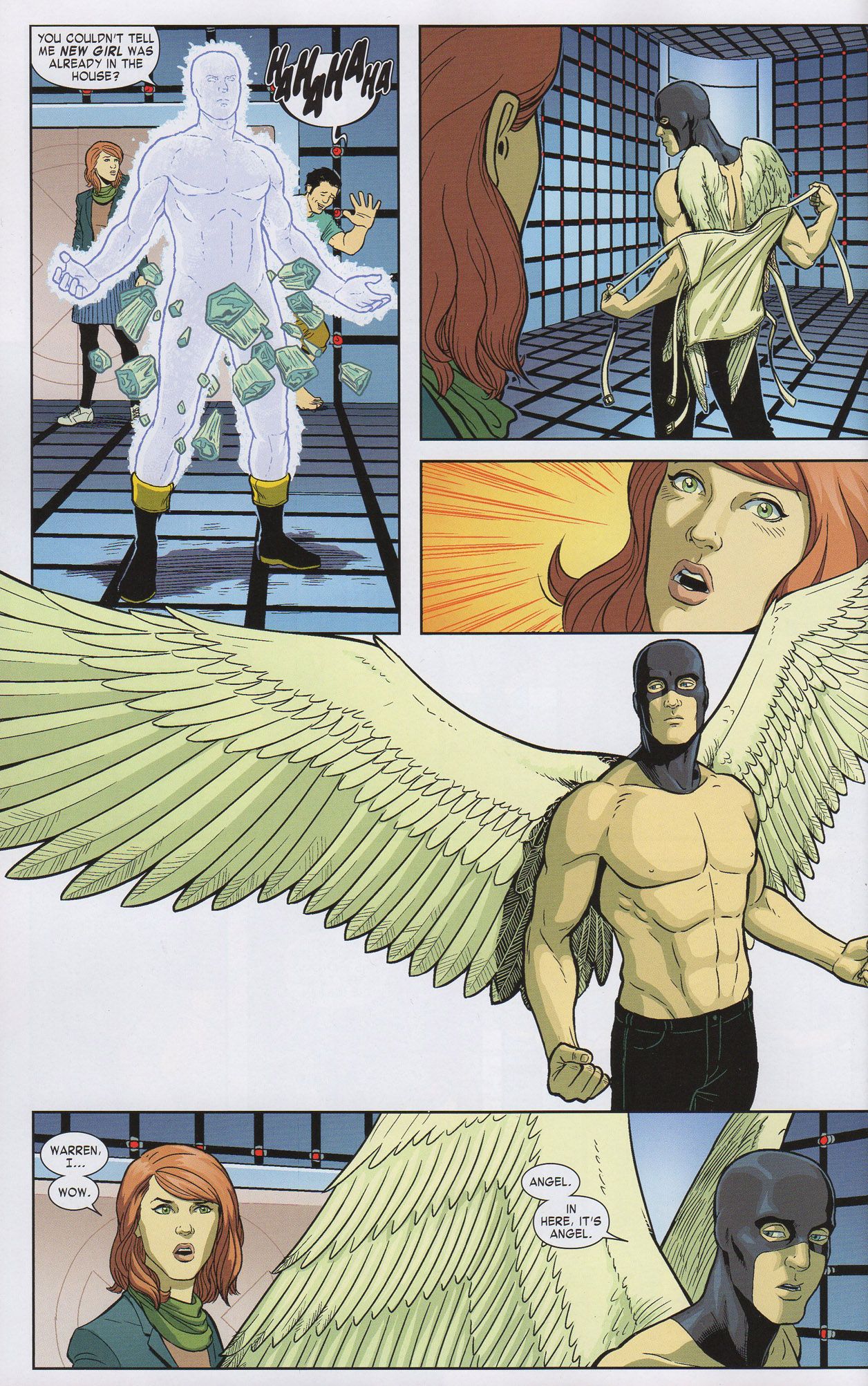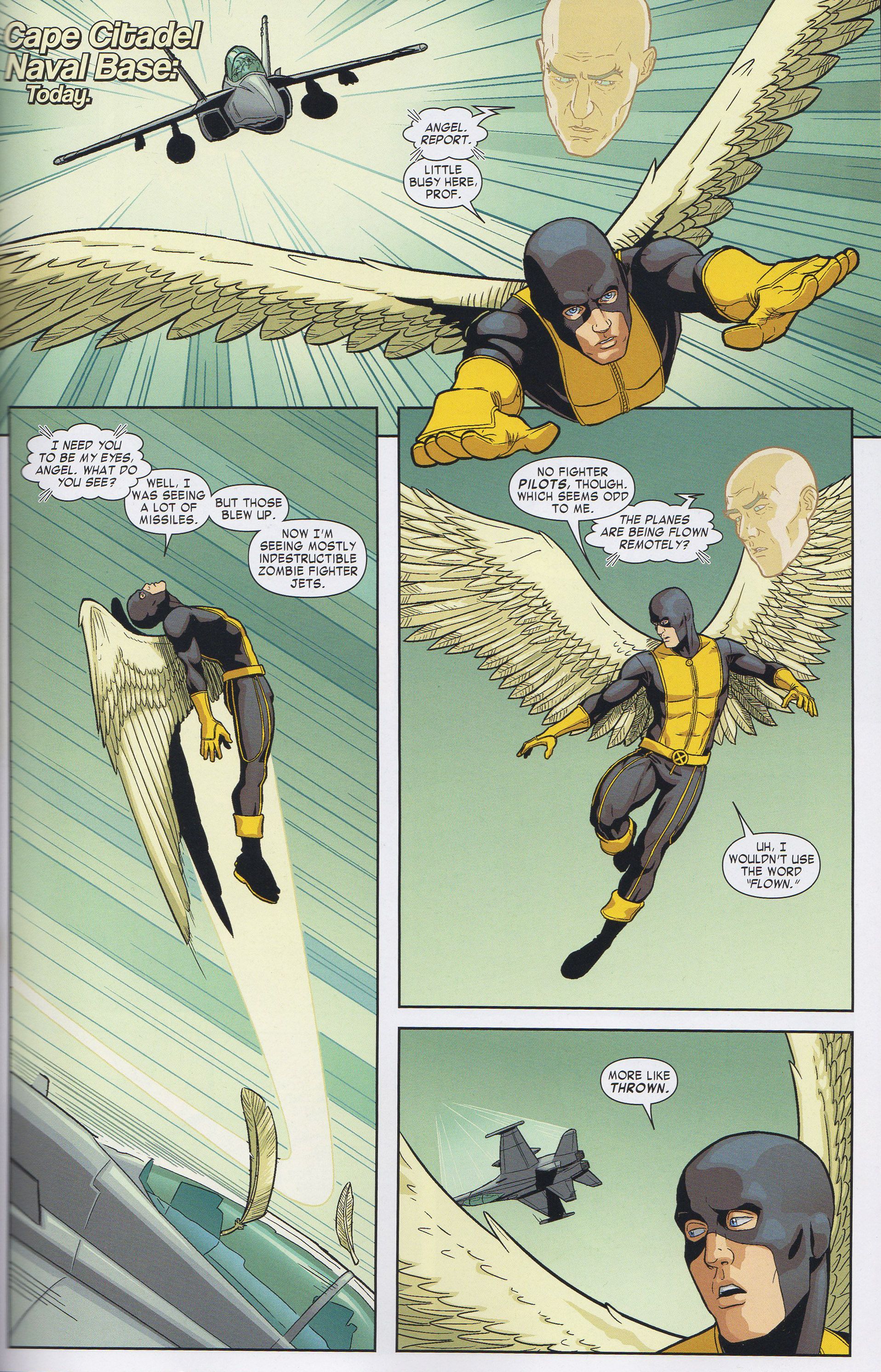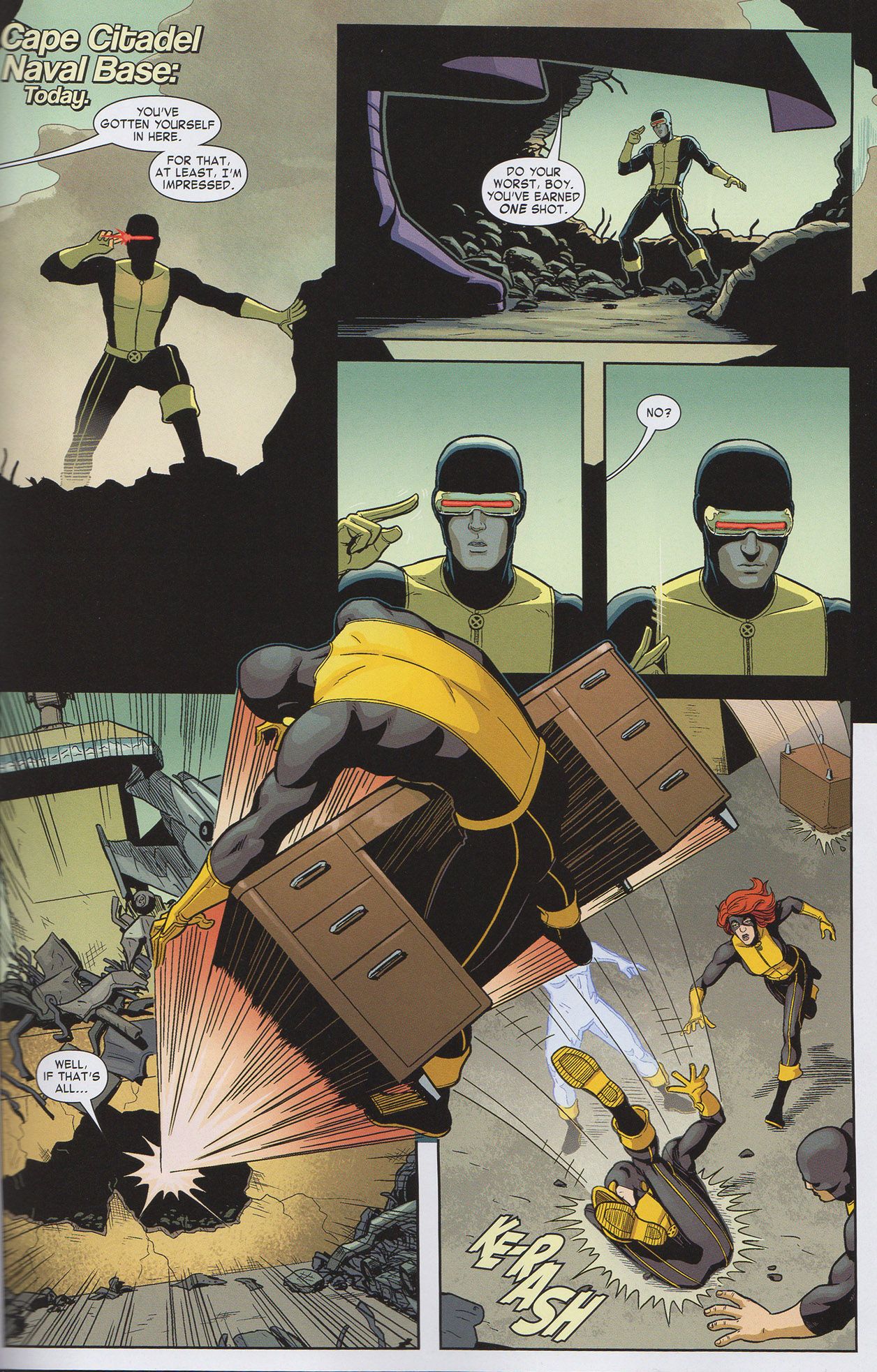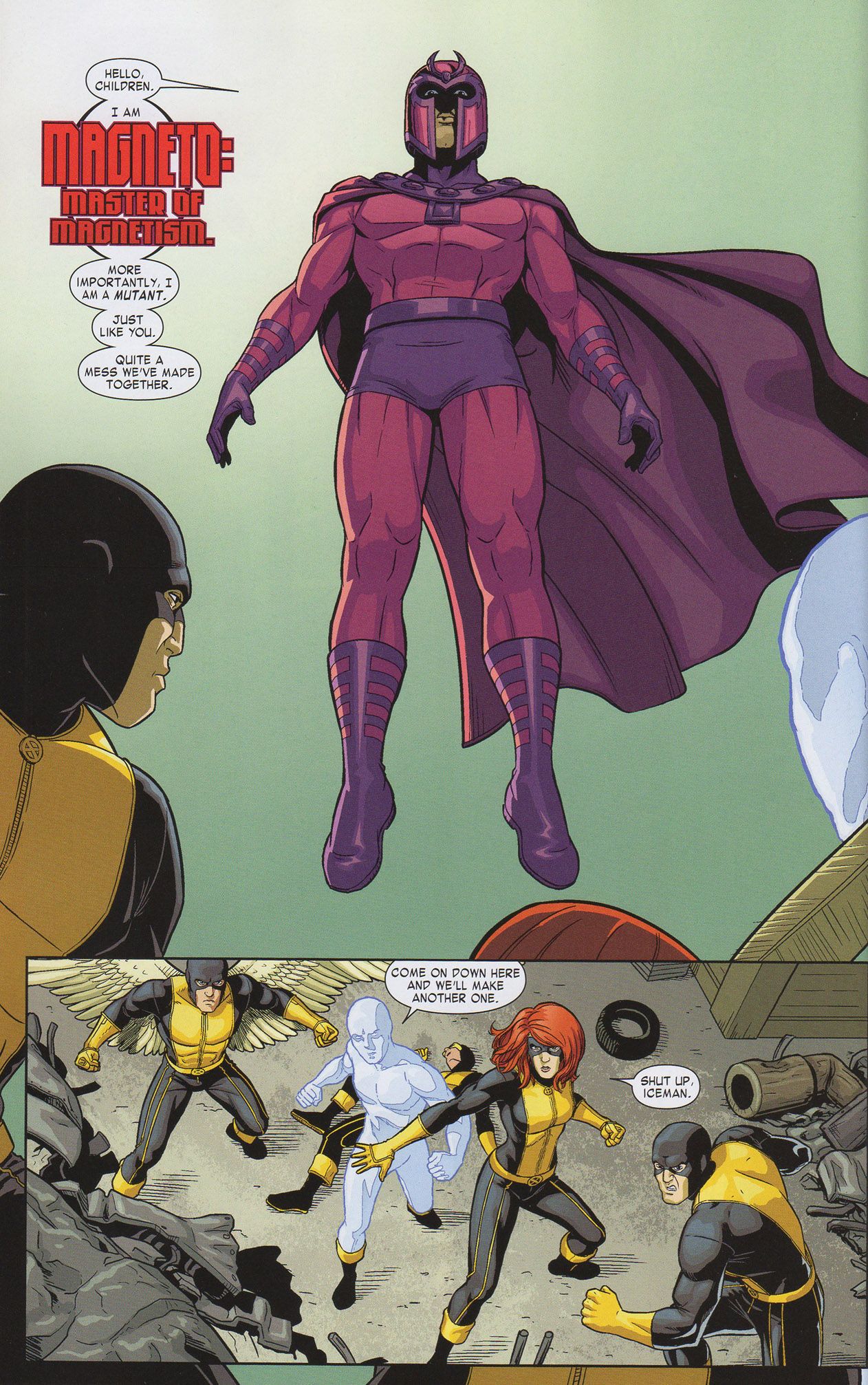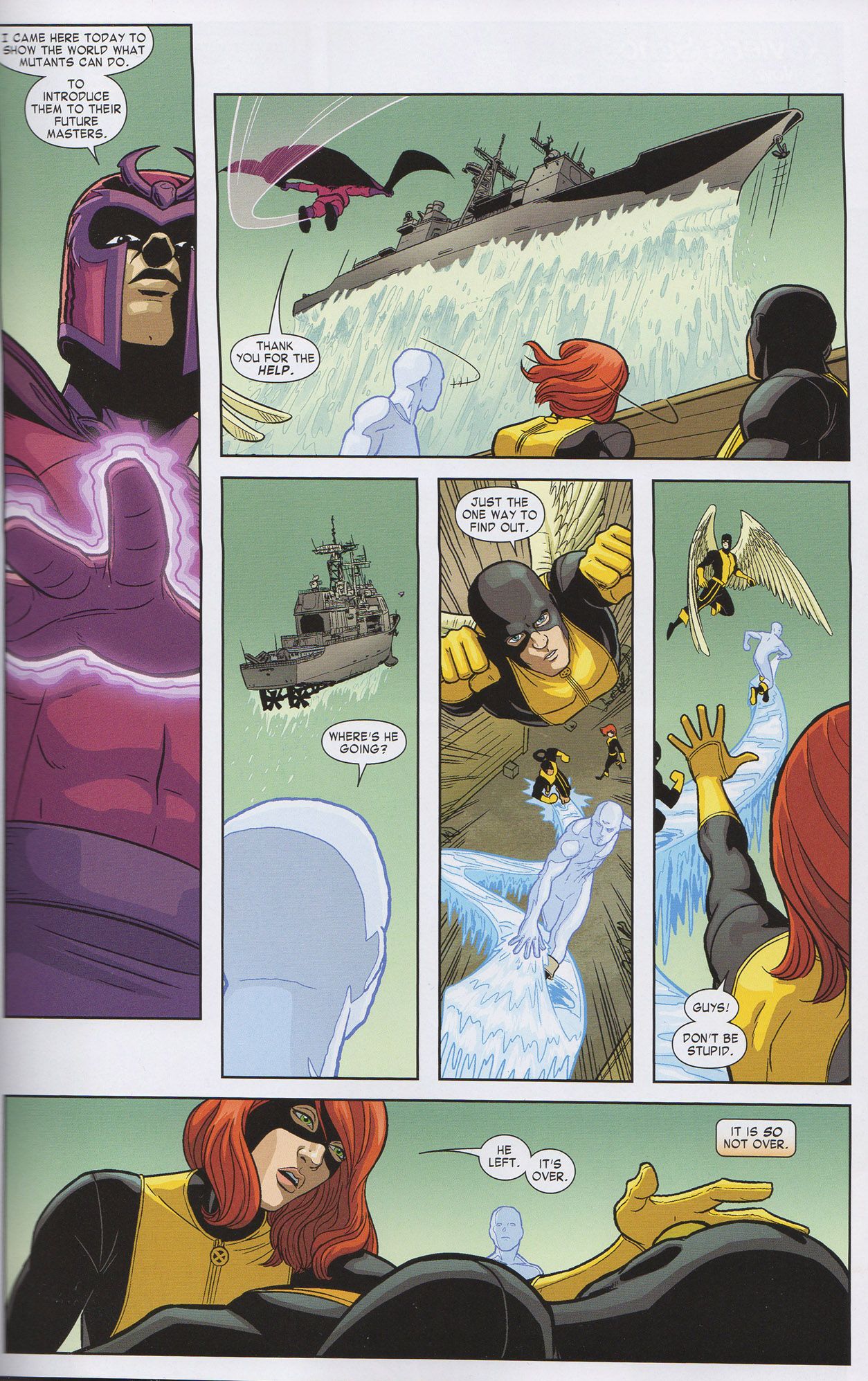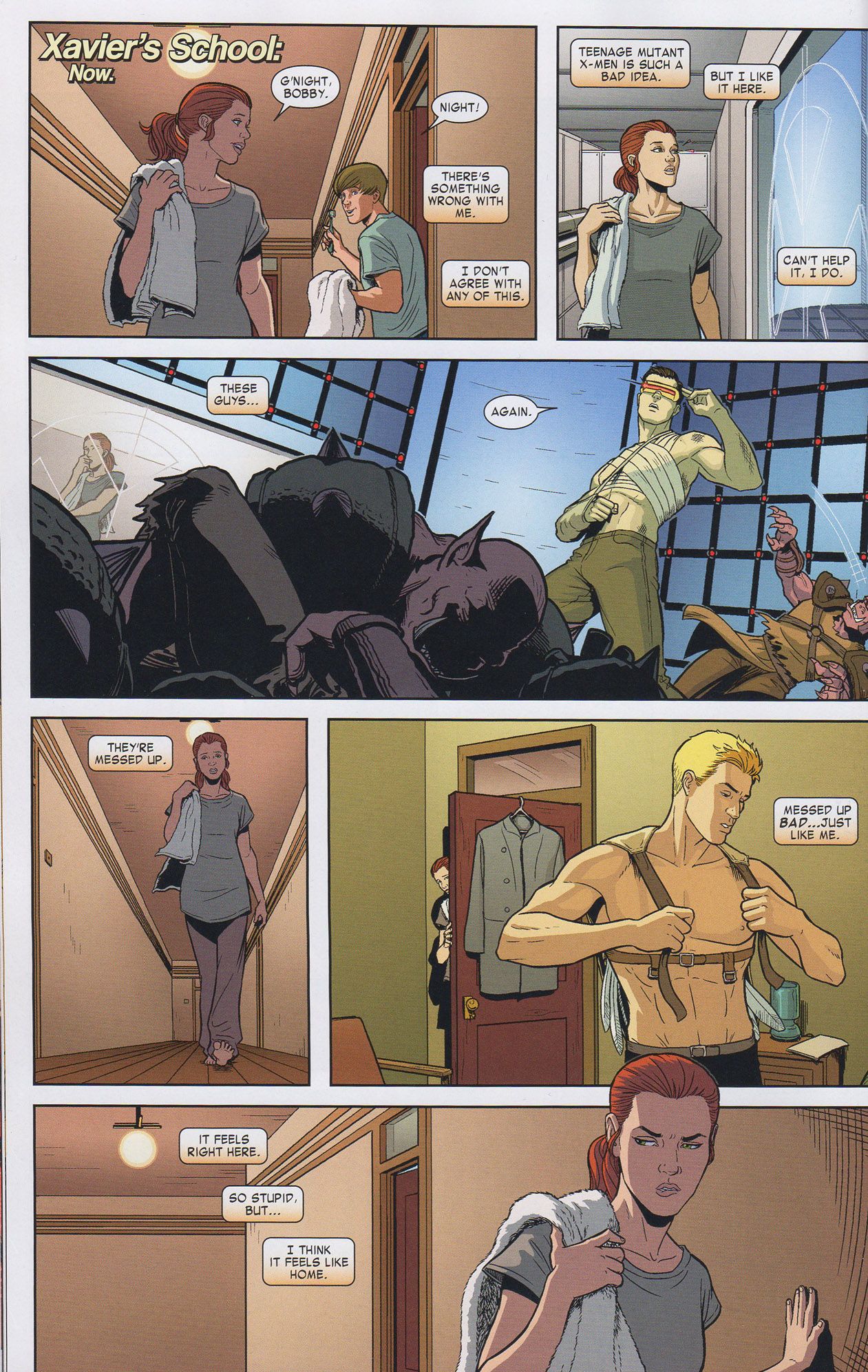X-Men Season One. Dennis Hopeless (writer). Jamie McKelvie, Mike Norton (artists).
Matthew Wilson (colors). Clayton Cowles (letters). Julian Totino Todesco (cover). Marvel Comics. Hardcover, full color, 136 pages (includes a preview of Uncanny X-Men). $24.99
As someone always on the lookout for strong layered portraits of female characters, I was delighted to find just that in Dennis Hopeless & Jamie McKelvie's X-Men: Season One (terrible title) in the form of their re-imagining of Jean Grey. I have never been a big fan of Jean Grey in any of her incarnations; she was always the definition of a Mary Sue to me. Too nice, too smart, too powerful, too kind, too beautiful (I mean she was a model at one point…gimme a break), too perfect, and everyone too in love with her. I mean, she was that character that when asked "what is your greatest weakness?" would have to be all “Um…my obsession with perfection?”
Sure there were portrayals of her over the years that I liked and stories I found interesting – like any X-Men fan I enjoyed The Phoenix and Dark Phoenix Sagas, and I never hated her or anything extreme, but she was never a character that worked for me as so many others did. Jean Grey never had that moment for me where a character you didn't care for one way or another suddenly became amazing - like for Cyclops it was when he led the nearly helpless Acolytes out of the Australian desert without bitching once in X-Men #44 - I never saw Scott Summers the same after that issue. But all that changes today. Jean Grey and I have finally had that moment, and it was not just one moment but a slight tweak to her in general throughout X-Men: Season One, that has finally made her very compelling to me and dare I say, for the first time, she feels human to me.
Not only does the book do a great job of potentially bringing in new readers and pleasing old fans (more on that in a bit) but it’s an excellent reminder of what a good character rehab can do. I frequently find myself writing off certain characters. “Oh, I don’t like so and so…never have…blah blah blah.” But one of the few great things about comic characters being owned by corporations is that there are in fact almost limitless opportunities for characters to be re-imagined or re-worked into something that is superior to what has come before (which is exactly the opposite position that I took recently here...isn't it nice when good books challenge your ideas!) This is one of those times where getting a chance to see a character a whole new way is a great thing, and I can now officially change how I think of Jean Grey, thanks to Hopeless and McKelvie's take. Nuanced and balanced? Yes! Realistic and well considered? Yes! Amazing but flawed? Yes! This is a Jean Grey I can get behind.
X-Men: Season One gives Jean Grey a much needed facelift, while somehow staying true to the character (and the events that we all know have come before). Hopeless and McKelvie have managed to create a layered amazing young girl who is still powerful and whip smart, but also full of doubt and insecurity, and even a few flaws. Though she continues to be adored by all her teammates, the relationships each feel unique and make sense for all the characters involved. They’re also far more nuanced than simply “boys pine for attractive redhead simply because she’s the only girl around.” Now, her crush on Warren Worthington seems warranted, and his obliviousness to it is painful but makes a certain amount of sense. Her sisterly affection (and annoyance) with young Bobby Drake has a nice dimension, and her deep friendship with Hank McCoy has layers that I’ve always felt were there for them as adults, but never really experienced. The result of fleshing all of those relationships out in more realistic and subtle ways, is that her relationship with Cyclops becomes even more interesting. Seeing them together, newly, but in the same story any X-Men fan knows by heart, for the first time really clicked for me. Sure, I know all the reasons she supposedly loved him - but I always had a hard time seeing it. But experiencing it through Hopeless and McKelvie's story is the difference between show and tell. I always knew the story, but now I can FEEL the story. And it makes all the difference. It’s clever and well done and I confess it made me insanely happy to see these characters I know so well slightly re-imagined and updated with such care and consistency.
In McKelvie’s hands, Jean is beautiful (with, it must be said, the most fantastic hair ever) but she still looks like a girl and not a supermodel. She has a wonderful style but it feels authentic and well considered rather than that same lazy “sexy/hot” thing comics is constantly trying to feed us. She's beautiful and fit, but she looks like a young girl, and one that could be an athlete. McKelvie's precise, clean, unfussy style is a perfect fit for a book like this because he both manages to capture these characters we all know and love, but brings a simplicity to his storytelling and character design that cannot possibly be off-putting to new readers. There is not a single panel that's confusing, and yet they're all beautiful as well. And while the focus of this book is Jean Grey, McKelvie clearly spent a lot of time thinking about the ways he could update all of these characters visually, while keeping them easily recognizable. Bobby has a an annoying Justin Bieber-ness that is clever; Scott looks appropriately closed off and serious with a side of OCD; Warren is dashing and handsome, but always in expensive looking tailored coats and jackets to hide his wings; and Hank, well, Hank has never looked better, and I've never been a huge fan of the visuals for pre-blue and furry Beast. With giant hands and feet, the latter of which always refuse shoes, and a short but wide body-type, McKelvie has done a particularly wonderful job capturing Hank's charm and beauty, and the body language that makes his character so distinctive.
X-Men: Season One makes an exceptional argument for updating and modernizing old stories and properties. What Hopeless and McKelvie have done is actually very subtle. It doesn’t feel like it’s trying too hard to reach an audience, or be cool, or badass, it just kind of is. Which is the best kind of cool quite frankly. The book is smart and funny, and the character work is top notch. Though Jean is the focus of the piece (another smart move since she’s the sole female character) all of the characters have good page time, and are credibly developed. The writing feels current, but with a few exceptions is not steeped in pop culture references or "modern flourishes" that it will feel dated any time soon. In 50 years will there be anything in this book as cringe inducing as reading Professor Xavier having a crush on Jean? I don't think so. Then again, I thought I'd have my hoverboard by now and be on my way to a flying car, and never imagined I'd be reading a book that wasn't an actual book, so what do I know? Certainly for now and the non-hoverboard forseeable future, the book stands up beautifully.
While Hopeless and McKelvie's book is obviously aiming for new readers (and quite successfully I would say, assuming they can get it into their hands) I don't think there's anything off-putting for old readers either. If you're just looking for good comics, they've done that too. The book easily straddles both worlds in more ways than one. It not only feels updated and modernized, while still being true to the characters; but it also manages to both innocently tell the story of the beginnings of these characters while nicely foreshadowing all that we know will come for them...all that many of us are seeing come to them in the pages of other books like the current runs of Uncanny X-Men and Wolverine & The X-Men, it's truly interesting stuff.
Check it out for yourself:
there is a page between these two (which is why the caption is repeated)
Without setting out to write this piece to take a swing at DC's new 52...I find myself going there anyway. DC relaunched their entire line...we all know it...we all feel differently about it. The net result for me, thanks to disappointing roles for female characters, and a kind of shocking lack of inspiration in a lot of the creators they opted to use to re-invent that line, is that I'm reading far less DC than ever before. This is not something I'm excited by as some of my favorite characters are DC characters - and I miss them - or at least I miss versions of them that I love and believe in - desperately. But I'm struck by Marvel's interesting work re-inventing things is a much smaller way...but with fantastic results.
This book is a perfect example. But you can also look at Brian Michael Bendis and Sara Pichelli's Ultimate Spider-Man, a nearly perfect superhero origin tale as far as I'm concerned. And while I know many fans were sad to lose the Ultimate Peter Parker (I'm sure he'll be back - it IS comics we're talking about), at least it being an Ultimate story allowed the original Peter Parker (and his longtime fans) to now lose everything. I know they're different, but I couldn't tell you how grateful I'd be to still be reading some version of Cassandra Cain...Ultimate or otherwise. So it's a way to give without entirely taking away, like so much of what we've seen with the new 52. You can also read Mark Waid and Paolo Rivera's completely enjoyable new Daredevil, which has a decidedly different feel to it than the Daredevil of years past, and Greg Rucka's Punisher. Again, a fairly new series, with incredibly talented creators on board and doing much more subtle reinventions...things that don't necessarily upset the apple cart, but are damn good comics. Then there's Jason Aaron and Chris Bachalo's flat out balls to the wall brilliant Wolverine & The X-Men. And even, in a slightly different way you have Warren Ellis' Secret Avengers - one of the best six-issue superhero comics runs I've read in years and which included a rotating cast of some of the best artists in the business.
These are all books with comparable issue runs to what DC has put out for the new 52, and yet pound for pound, they're far better books than what I'm seeing at DC. Sure, DC has some standouts. Batwoman has been great, but the writing in the new arc has been confusing and terribly erratic, and now we're having a disappointing art team shake up after just eight issues. Duane Swierczynski's Birds of Prey is fantastic, but eight-issues in we're losing the artist that helps make it so great - Jesus Saiz. Of course Travel Foreman will also be good, but inconsistency like that is terrible for books that are struggling to find their audience. Scott Snyder's Batman is wonderful, as is his Swamp Thing, and Jeff Lemire's Animal Man, but these are the shining standouts among an entire line of 52 books - many a handful of which have already been canceled. Meanwhile the reworked books I've read on Marvel's side are pretty much ALL good, with smart and consistent creative teams, and even excellent fill-in artists that keep the quality level unbelievably high (Chris Samnee on Ultimate Spider-Man, Nick Bradsaw on Wolverine & The X-Men, etc)
It all lends weight to the idea, for me at least, that a line-wide relaunch ends up being mostly a publicity stunt that doesn't serve your books long term. It's too hard to get the quality you need when there's that much overhaul, and not enough oversight. You're better off using a scalpel than a hatchet when approaching these things. With a scalpel you can pick and choose and do it right and get books like X-Men Season One, with a hatchet the precision is gone, and you end up mostly with noise (possibly screaming).


